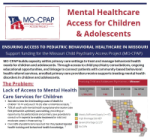Advocacy

The Mental Health America name represents how critical mental health is to the overall health and well-being of every American. The bell image in our logo is a graphic representation of an actual 300-pound bell, the Mental Health America Bell. It was forged in 1953 from the iron chains and shackles that bound people in mental asylums. It serves as a reminder of our past, the progress, and is a powerful symbol of our vital mission to help all Americans live healthy and productive lives.
Mental Health America of Eastern Missouri advocates for the more than one million Missourians who experience a mental health or substance use disorder each year. We engage policymakers, providers, the public, and the press to promote early intervention, expand access to affordable services, and eradicate stigma and discrimination.
Our work is driven by our commitment to promote mental health as a critical part of overall wellness, including prevention services for all, early identification and intervention for those at risk, integrated care, services, and supports for those who need it, with recovery as the goal. Much of our current work is guided by the Before Stage 4 (B4Stage4) philosophy – that mental health conditions should be treated long before they reach the most critical points in the disease process.
2021 - 2022 Legislative Priorities
Parity for Mental Health Coverage
Parity is legally recognizing mental health conditions and substance use as equal to physical illnesses. Without parity mental health treatment is often covered at far lower levels in health insurance policies than physical illness, which means people do not get the care they need to experience recovery. Missouri’s parity law does not include substance use disorders, including opioids, which have reached an epidemic level.
Missouri Child Psychiatry Access Project
 Although 1 in 5 youth live with a mental health condition, less than half receive needed services. Undiagnosed, untreated, or inadequately treated mental health conditions can affect a youth’s ability to learn, grow, and develop. Because there is a severe shortage of child psychiatrists in Missouri, many children with behavioral health issues are treated by primary care providers who have little or no formal education in this area. A full 65% of pediatricians reported they lack mental health training and behavioral health knowledge. MHA-EM participates on the Legislative Committee of the MO Child Psychiatry Access Project (MO-CPAP) so that all Missouri children and adolescents have access to quality pediatric behavioral healthcare.
Although 1 in 5 youth live with a mental health condition, less than half receive needed services. Undiagnosed, untreated, or inadequately treated mental health conditions can affect a youth’s ability to learn, grow, and develop. Because there is a severe shortage of child psychiatrists in Missouri, many children with behavioral health issues are treated by primary care providers who have little or no formal education in this area. A full 65% of pediatricians reported they lack mental health training and behavioral health knowledge. MHA-EM participates on the Legislative Committee of the MO Child Psychiatry Access Project (MO-CPAP) so that all Missouri children and adolescents have access to quality pediatric behavioral healthcare.
MO-CPAP provides free, same-day expert child psychiatry phone consultation to primary care providers (PCPs) in 15 counties in eastern and central Missouri. The program will expand to allow statewide enrollment of primary care providers in October 2020. Through consultations, educational opportunities and linkage to help connect patients with referral services, PCPs receive clinical support to help them treat behavioral health disorders in children and adolescents.
How big is the shortage in Missouri? There are only 11 Child and Adolescent Psychiatrists in Missouri per 100,000 children/teens. Click here for more information.
Ensure open access to mental health medications through Medicaid and private insurance
The right medications are key to recovery for many individuals with mental health conditions. Choice is important because individuals react differently to different medications. Restricting psychotropic medications shifts costs to the wrong places. Preferred drug lists, prior authorization requirements and other restrictions pose substantial risks for people with serious mental health conditions. Medication failures can lead to emergency room visits, hospitalization, school failure, job loss, incarceration and loss of life. MHA-EM supports protective language in statute for psychotropic medications under Medicaid.
Medicaid Expansion in Missouri (MO Health Net)
In 2012, the Supreme Court affirmed the constitutionality of the Affordable Care Act but made Medicaid expansion optional for states. This resulted in 37 states expanding, but unfortunately Missouri was not one of them.
It was not until August 2020 that Missouri voters approved a ballot measure that added Medicaid expansion to the state’s constitution and prohibited any additional burdens or restrictions on eligibility for the expansion population. Medicaid coverage under expansion began when the state started accepting applications in August 2021 and began processing applications in October 2021, with coverage retroactive to July 1, 2021 consistent with a state supreme court order.
Governor Mike Parson had publicly announced that the state would not implement expansion because the ballot measure did not include a revenue source. However, in May 2021, individuals who would be eligible for expansion coverage filed a lawsuit against the state, and in July 2021, the Missouri Supreme Court ruled that the initiated amendment was valid under the state constitution and that the legislature’s budget appropriation authorizes the state to fund expansion coverage.






















